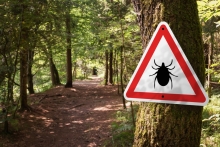Tick-borne pathogens, known for causing illnesses such as Lyme disease, are on the rise in Central Canada – presenting new risks in areas where they were never previously detected.
The findings from researchers at McGill University and the University of Ottawa demonstrate the need for more comprehensive testing and tracking to detect the spread and potential risk of tick-borne pathogens to human and wildlife populations throughout Canada.


